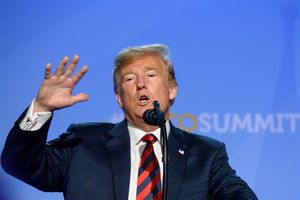The dollar index (DXY00) on Wednesday gave up an early advance and finished down by -0.08%. The dollar fell slightly on Wednesday after the Nov MNI Chicago PMI posted a 17-month low. Also, strength in stocks on Wednesday has curbed liquidity demand for the dollar. The dollar initially moved higher on Wednesday on better-than-expected US economic news, with weekly jobless claims unexpectedly falling to a 7-month low and Sep capital goods new orders rising more than expected.
The dollar is also under pressure after Bloomberg reported that Kevin Hassett is leading the list of potential next US Fed Chair candidates to replace Jerome Powell. Hassett's nomination would be bearish for the dollar as he is seen as a dovish candidate. Also, Fed independence would come into question, as Hassett supports President Trump's approach to cutting interest rates at the Fed, which Trump has long sought to control.
US weekly initial unemployment claims unexpectedly fell -6,000 to a 7-month low of 216,000, showing a stronger labor market than expectations of an increase to 225,000.
US Sep capital goods new orders nondefense ex-aircraft and parts, a proxy for capital spending, rose +0.9% m/m, stronger than expectations of +0.3% m/m.
The US Nov MNI Chicago PMI fell -7.5 to 36.3, weaker than expectations of 43.6 and the steepest pace of contraction in 17 months.
The Fed Beige Book was mixed as it stated, "Outlooks were largely unchanged overall, with some contacts noting an increased risk of slower activity in coming months, while some optimism was noted among manufacturers."
The markets are discounting an 80% chance that the FOMC will cut the fed funds target range by 25 bp at the next FOMC meeting on December 9-10.
EUR/USD (^EURUSD) rose to a 1-week high on Wednesday and finished up by +0.23%. The euro moved higher on Wednesday on comments from ECB Governing Council member Boris Vujcic, who said risks to economic growth and inflation in the Eurozone are balanced, and "for the time being," interest rates are in a good place.
Uncertainty about the Russian-Ukrainian peace plan is limiting gains in the euro after European Commission Vice President Kallas said Wednesday that "we see no indication from Russia that they want peace."
Swaps are pricing in a 1% chance of a -25 bp rate cut by the ECB at the December 18 policy meeting.
USD/JPY (^USDJPY) on Wednesday rose by +0.24%. The yen was under pressure from Wednesday's 1.85% rally in the Nikkei Stock Index, which reduced safe-haven demand for the yen. Also, Wednesday's report showing an easing in Japan's PPI service prices is dovish for BOJ policy and negative for the yen.
Losses in the yen were limited after Wednesday's news showed Japan's Oct machine tool orders and the Sep leading index CI were revised upward, supportive factors for the yen. Also, Reuters reported that the BOJ is preparing markets for a possible interest rate hike as soon as next month, amid inflationary risks posed by a weak yen.
The Japan Sep leading index CI was revised upward by +0.6 to an 11-month high of 108.6 from the previously reported 108.0.
Japan's Oct machine tool orders were revised upward by +0.3 to 17.1% y/y from the previously reported +16.8% y/y, the largest increase in more than three years.
Japan Oct PPI services price eased to +2.7% y/y from +3.1% y/y in Sep, right on expectations.
The markets are discounting a 34% chance of a BOJ rate hike at the next policy meeting on December 19.
December COMEX gold (GCZ25) on Wednesday closed up +25.20 (+0.61%), and December COMEX silver (SIZ25) closed up +1.951 (+3.83%).
Gold and silver prices rose to 1.5-week highs on Wednesday and settled higher. Demand for precious metals as a store of value has increased after Bloomberg reported that Kevin Hassett is leading the field as the potential next US Fed Chair to replace Jerome Powell. Hassett is seen as a dovish, pro-liquidity candidate, and his nomination would question the Fed's independence, as Hassett supports President Trump's approach to cutting interest rates at the Fed, which Trump has long sought to control.
Also, recent dovish Fed comments have increased the likelihood of a rate cut at next month's FOMC meeting to 80% and boosted demand for precious metals as a store of value. In addition, precious metals have underlying safe-haven demand amid uncertainty over US tariffs, geopolitical risks, and central bank buying.
Concerns over tightness in Chinese silver supplies are a bullish factor for silver prices. Silver inventories in warehouses linked to the Shanghai Futures Exchange have fallen to the lowest level in 10 years.
On the negative side of precious metals was Wednesday's rally in stocks, which reduced safe-haven demand for precious metals. Also, improving prospects for an end to the war in Ukraine have curbed safe-haven demand for precious metals.
Strong central bank demand for gold is supportive of prices, following the most recent news that showed bullion held in China's PBOC reserves rose to 74.09 million troy ounces in October, the twelfth consecutive month the PBOC has boosted its gold reserves. Also, the World Gold Council recently reported that global central banks purchased 220 MT of gold in Q3, up 28% from Q2.
Since posting record highs in mid-October, long liquidation pressures have weighed on precious metals prices. Holdings in gold and silver ETFs have recently fallen after posting 3-year highs on October 21.
On the date of publication, Rich Asplund did not have (either directly or indirectly) positions in any of the securities mentioned in this article. All information and data in this article is solely for informational purposes. For more information please view the Barchart Disclosure Policy here.
More news from Barchart





